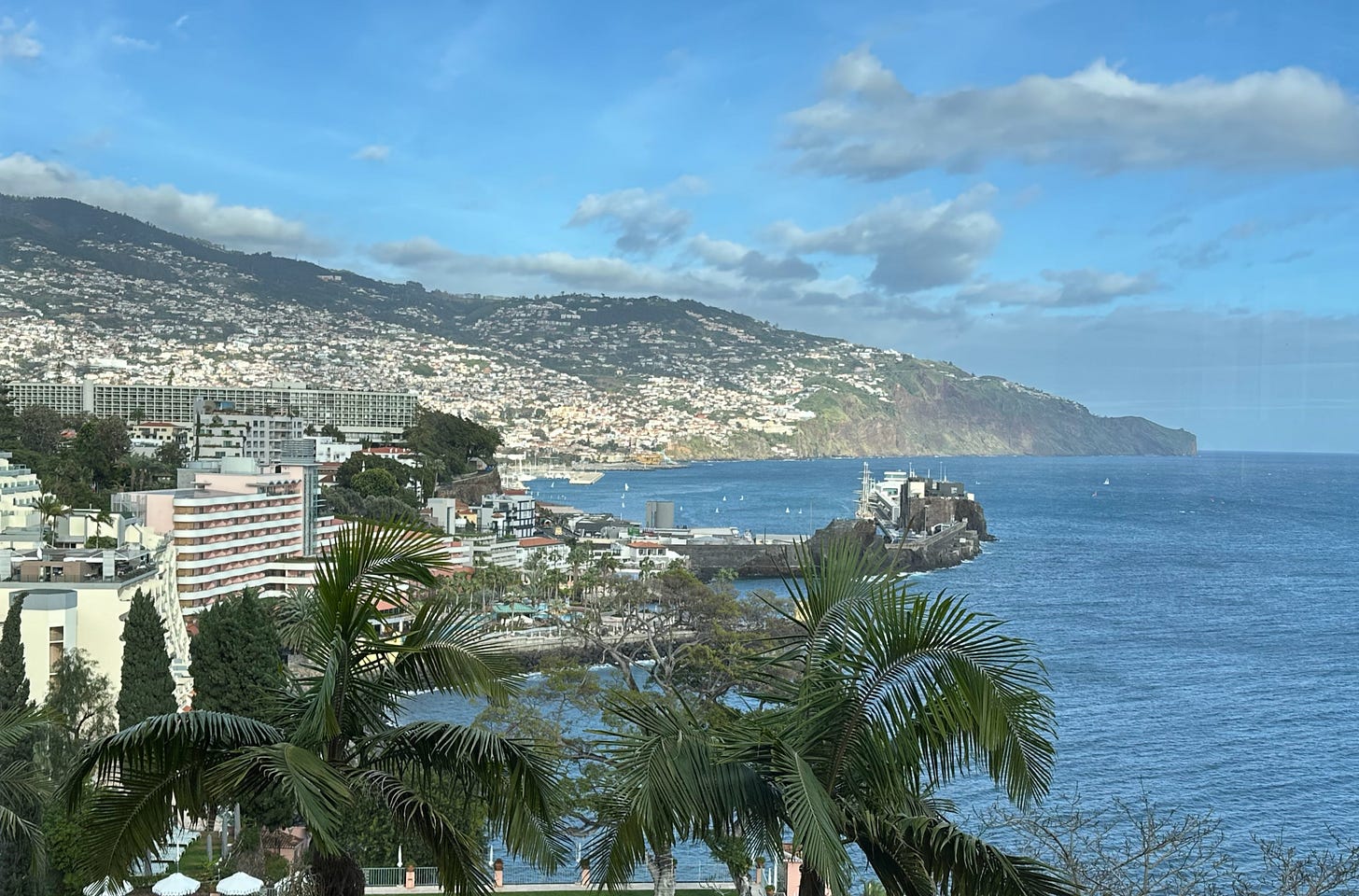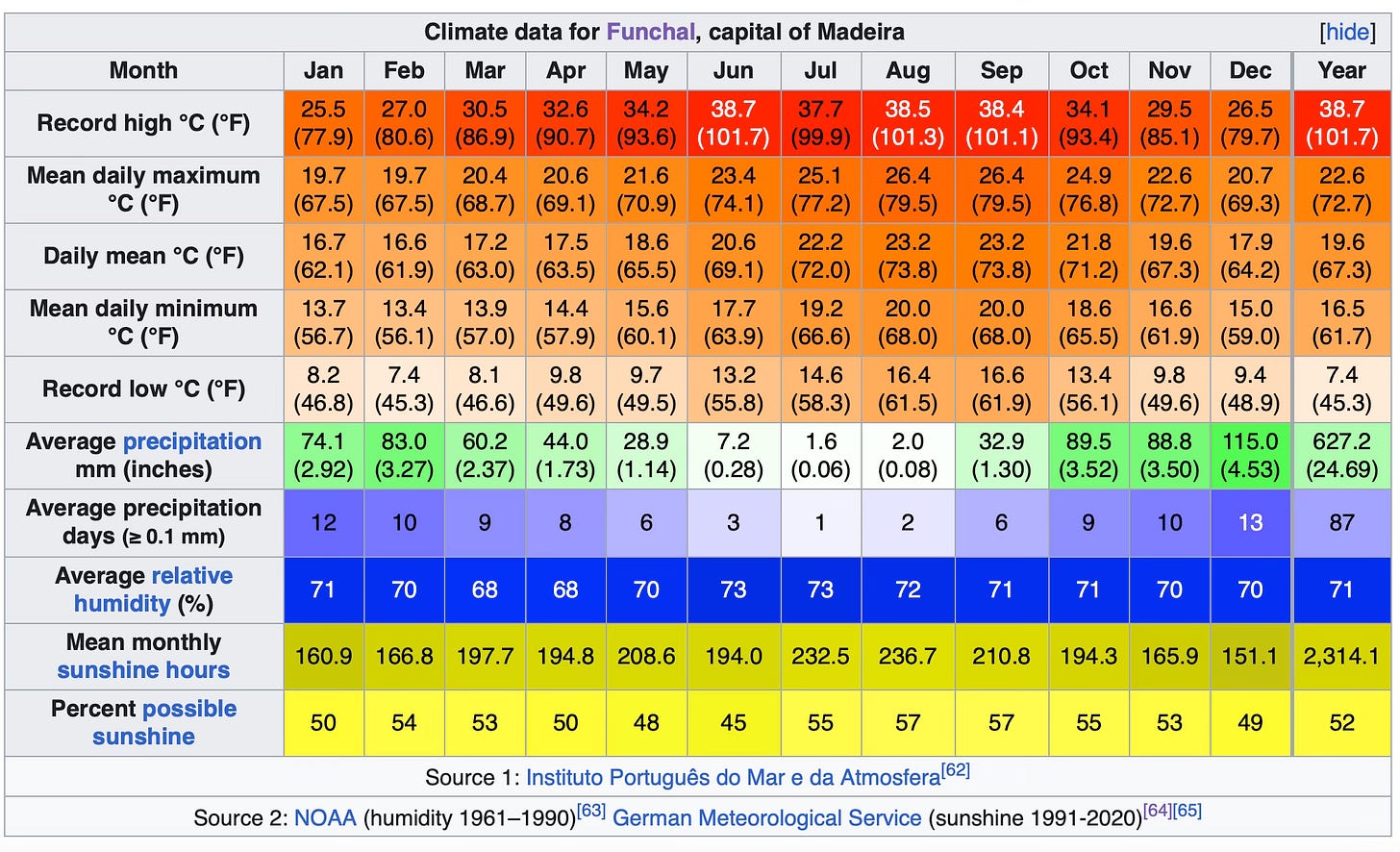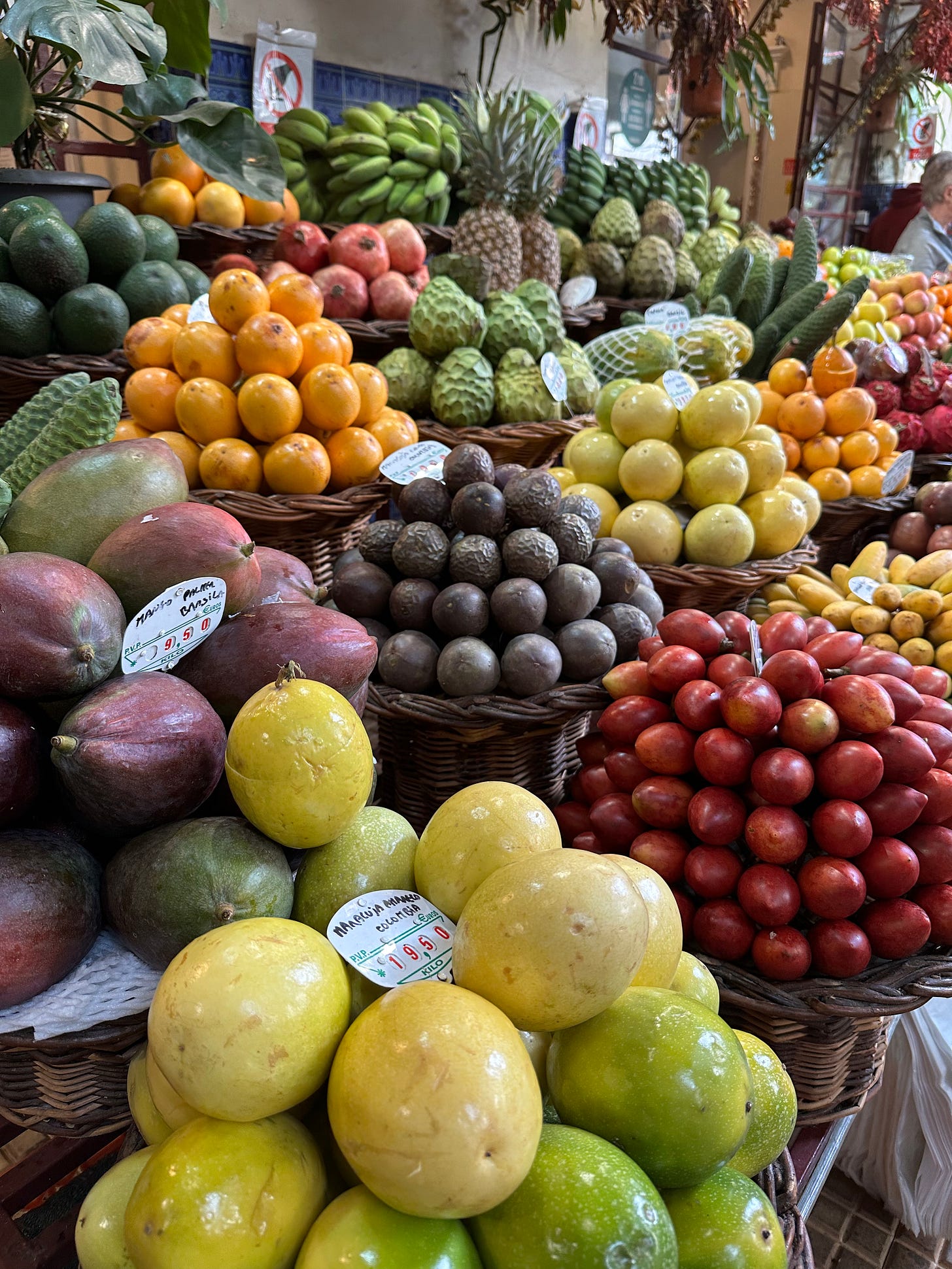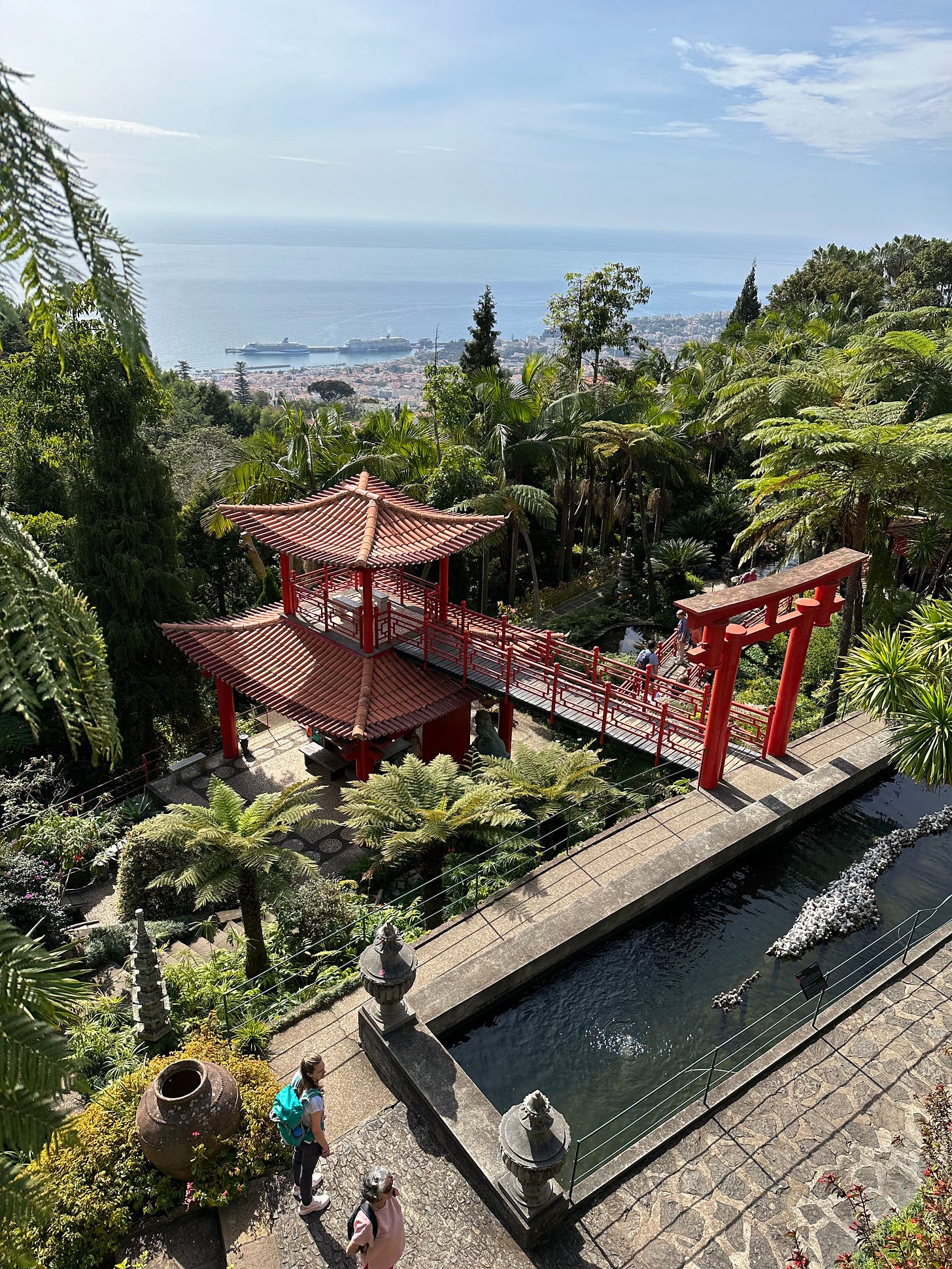We just returned from a five-day holiday in Madeira. It was a quick 90-minute flight from Lisbon to Madeira, an island off the western coast of Africa which the Portuguese first settled in approximately 1420. The airport is located in Madeira’s capital, Funchal, which just over 100,000 people call home.
Quick History
Like many geographical discoveries, Madeira’s “discovery” by João Gonçalves Zarco and Tristão Vaz Teixeira, who served under Henry the Navigator, was an accident. Driven off course by a storm, they landed on an island and named it Porto Santo, Holy Harbor. A year later, they returned to establish a Portuguese settlement, and it was only then that they discovered the larger island that today is called Madeira.
Madeira’s growth was in part spurred on by the bubonic plague which ravaged Europe in the 14th century. Portuguese fishermen and peasants sought refuge on the island. They chopped down dense forests and built water channels, levadas, to bring water to their crops. Sugar cane production fueled the island’s early economic growth, but was later replaced by wine production.
Its climate attracted the aristocracy, and hotels sprung up on the island. I enjoyed a drink with an American living in Funchal during my visit at The Belmond Reid Palace, first opened in 1891. The hotel was started by a Scotsman who like others from the UK was also involved in Madeira’s wine industry.
First Impressions
Perhaps it was the early and continued presence of British citizens that caused English to be so widely spoken on the island. Frankly, this is a place you can comfortably live without ever speaking a word of Portuguese. It may be the one Portuguese city where English is even more widely spoken than Cascais.
Like Cascais, Funchal is also a very clean city! We did not observe untethered dogs roaming the streets and rarely saw their excrement on the sidewalk. While there are some abandoned buildings, we saw far more public artwork than graffiti during our visit.
Also, like Cascais, it has a very vibrant tourism vibe. Cruise ships were in port on 3 of the 5 days during our visit. The city offers a wide array of fine restaurants and lots of shops to explore on a rainy day. Funchal also offers great attractions (like the cable cars, botanical gardens, toboggan run, Mercado, etc.) which I will share with you next week.
As the chart above shows, Madeira also offers a very pleasant and temperate climate. While there were some record-setting hot days last summer, the mean temperature remains most days between 67 and 77 degrees Fahrenheit.
Not That Expensive
If all of the above seems too good to be true, permit me to add what I found most surprising. That is, I did not find prices to be that expensive. Of course, luxury homes are being built…but in general, for less than the same house would cost in Cascais. And if you leave the downtown area, you can find more moderately priced apartments and homes.1 The temperate climate also reduces utility bills.
During our visit, I was surprised to find fuel at €0.10/litre less than on the mainland. (How is this possible?) And car sharing services and taxis were abundant and very competitively priced.
Food was generally in line with our local markets, and the variety of fruits and vegetables was unparalleled.2 And while we enjoyed some outstanding (and more expensive meals) on the island, I also saw €0.80 coffees advertised at neighborhood pasteleiras.
So What’s Not to Like
I must admit that had we visited Funchal before buying and remodeling a building in VRSA I would have tried my damnedest to convince Denise to live on this island. I know I know…the flat grid-patterned streets were one of the major draws of VRSA. But, this is a beautiful island. For me, it had the feel of living in a European Hawaii. And the only negative I have found in Madeira so far is the hills.3 If you want to avoid living in the tourist zone, you must go up. We stayed in a wonderful AL, right next to the stadium, a short 15-minute walk from downtown. Returning to the apartment (uphill) took a bit more time.4 Truth be told, after finding that we could return via taxi for under €6 we seldom returned on foot.
But there is much to love about Madeira…we will return! And with Onix along, we plan to stay for a bit longer.
Last but not least: I want to thank my many readers who sent birthday wishes via comments or email. When I imagined 70 as a younger person, I never thought this would be my life. I am so fortunate and grateful for each of you!
Próxima semana um dia no Funchal, Tchau
Nanc
It may be that I have gotten used to Algarve home prices, which like Lisbon are above the Portuguese average. Also, I realize my comments sound insensitive. While prices may not seem high to me, I realize many Portuguese are priced out of the market.
Of course, I have never lived on an island for several years. I realize some people develop island fever. I also met a reader some time back who was living in Madeira. During her visit to VRSA, she commented that she suffered from vertigo when on the island in part because of the windy roads, extreme hills, and ocean movement. Not sure if this is a clinically diagnosed condition, but I can attest to the fact that Denise got a little uncomfortable during our drive from the airport.
Somewhere I read that the hill had a 28% grade…not sure if that is true.








Super perspectives Nancy! When we did our "discovery trip" 2 years ago to decide where we wanted to live in Portugal, we first visited Madeira (before we visited the mainland) to property hunt because we love islands and wanted to see if living on this one might resonate for us. We purposely went in March in order to check out the island's winter weather. We found that the weather was no warmer than the Algarve – and, in fact, could be colder, particularly in the higher reaches beyond what they call the “banana belt” where bananas do not grow.
The picturesque island and its big city, Funchal, are charming but our decision to settle on the mainland was because of 3 major drawbacks to Madeira: 1) the wear and tear of traversing the steep, uneven and calçada-lined streets would take its toll on our aging backs 2) moving from Florida, we wanted the warmest winter weather possible and saw that Southern Portugal was a better bet and 3) the island’s beaches are comprised of pebbles and, since we like to walk the beaches, we prefer the fine sand of the Algarve beaches.
With all this in mind, we reserved Madeira as a “nice place to visit” and ended up settling in the western Algarve where we purchased a place in Lagos. It was the right answer for us. We love it!
Chinese people tell me that walking up big hills=longevity, so maybe not such a bad thing after all.